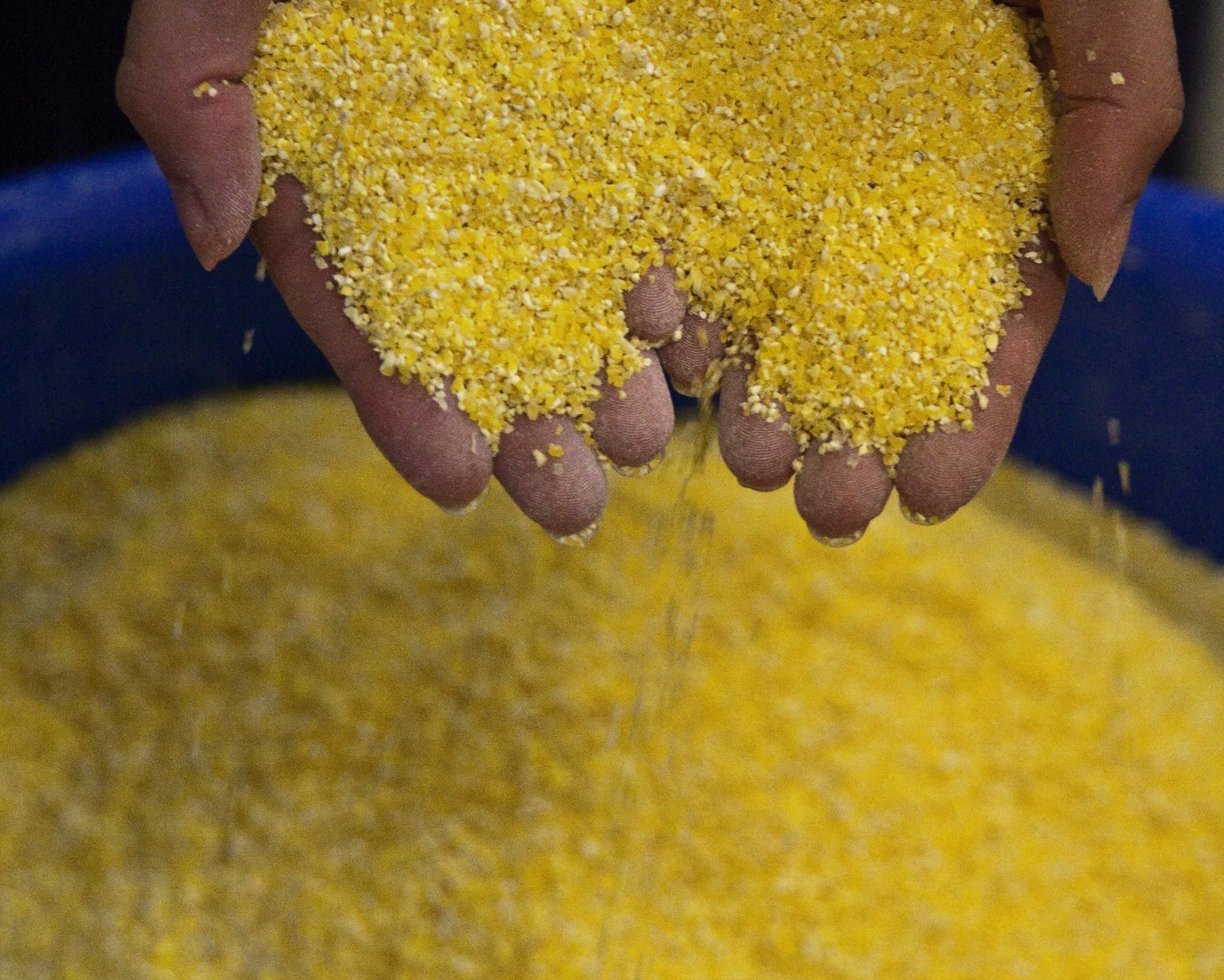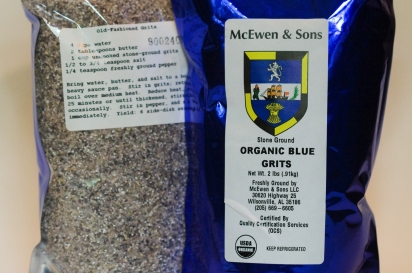McEwen & Sons Strikes Gold (Grits) in Wilsonville
Wilsonville has one stoplight. Around it, four churches congregate near a town hall. The only restaurant in sight is DJ's BBQ, a red, white and blue-painted building serving up pulled pork sandwiches, Golden Flake potato chips and slices of pie. On a corkboard out front, amidst ads for septic services and fondant decorators, a flyer for an equine burial service promises to “handle your horse with the care you expect.”
This is the heart of Shelby County, and the home of internationally-recognized McEwen & Sons Gristmill.
The organic grits and cornmeal being produced at this small, family-owned mill have proven an unlikely hit. Since opening in 2003, distribution has grown to reach an exhaustive spread of Birmingham notables—among them, Fancy’s on 5th and Trattoria Centrale—and stretches as far as Toronto, Napa Valley and New York.
For Ralph McEwen, the company's founder and tireless champion, the success was happenstance. "My wife, Helen, and I started the corn-grinding business in an effort to embrace a healthier diet emphasizing organic foods and whole grains," he says.
GRIST FOR THE MILL
Milling involves turning grains such as corn into flours such as grits. Stone-grist milling, the technique used at McEwen & Sons, is an old-fashioned process that uses stones (as opposed to modern, industrial rollers) to grind grains.
Stone milling is imprecise, but there’s a clear benefit: stone-grist mills operate at a lower temperature than the steel-roller mills used for mass-ground grains, retaining flavorful and nutritious oils that would otherwise evaporate.
These oils, most present in the corn’s germ (the infant plant) and bran (its protective coating), are not present in mass-produced grits. Refined grits only retain the comparatively-bland endosperm (a foodstore for the sprout). Those grits have a longer shelf-life, but not nearly as much fiber, B Vitamins or protein as their stone-ground counterparts.
While Ralph McEwen had some experience in milling—his parents own Coosa Valley Milling & Hardware, a livestock feed mill and farm supply store—he knew nothing about this special technique when he and his wife started their business. He got the idea from his parents, who had discovered stone-grist milling while traveling across the country in a motor home.
They had stopped to visit Dolly Parton’s hometown of Sevierville, Tenn., and there, across from the country maven’s statue, was a farm store not unlike the McEwen’s Wilsonville location today. Inside, it had a stone-grist mill, and the owners provided cornmeal to surrounding restaurants.
For McEwen’s parents, it was a charming encounter. But McEwen was intrigued, and a few years later bought a mill of his own. He had no idea how to use it; it doesn’t have factory settings. He found a guy who could help him turn it on and set the stones. (Though he hasn’t had to replace the stones since, he has had to refinish them. He and a friend did it themselves. “Nothing to it…looked it up on the YouTube,” he says.)
Once the stones were in place, McEwen began experimenting. "I sent samples out to some high-end restaurants in Birmingham, just on a fluke," he says. "And Frank Stitt called me back.”
THE STITT EFFECT
Frank Stitt, Birmingham’s chef célèbre, has an influence that’s difficult to overstate. His flagship restaurant, Highlands Bar and Grill, paired Southern cuisine with French cooking decades before it was cool; the James Beard Foundation has nominated Highlands for “Most Outstanding Restaurant in America” nine times.
Guided by the light of the slow food movement, a philosophy that promotes the preservation of local culinary traditions and ingredients, Highlands and Stitt became the unwitting Big Bang to Birmingham’s ever-expanding farm-to-table culinary universe. As Stitt’s protégés (and his protégés’ protégés) launched their own restaurants—a who’s of who of Birmingham food that includes Hot and Hot Fish Club, El Barrio, Brick & Tin and Jim ‘N Nick’s, to name a few—they brought Stitt’s outlook and McEwen’s grits with them.
Part of the appeal of McEwen's grains is that they are sourced from USDA-certified organic corn, meaning they are grown without pesticides or chemical fertilizers. Though his products proved a perfect fit for the slow food revolution, McEwen says he wasn’t playing to the gallery; his interest in organic food came purely of a desire to take care of himself and his family. “We were just trying to eat more healthy,” he says.
When making his nutrient-dense corn flour, the only portion of the kernel that McEwen removes is the husk. Like a peanut shell, the husk is indigestible by humans, and proves more valuable as cow feed. Though it’s possible to buy a machine that separates the husk, McEwen says it’s prohibitively expensive. He prefers to do it “like they used to do in the Bible: Throw wheat up in the air and just let the wind sift it off.”
His solution is a bit more elegant. He sets an electric fan on a chair in front of a plastic tub. Then he drops fresh-ground corn in front of the fan, and the husk is blown away. The heavier corn drops into the receptacle, where it’s ready to be weighed and bagged by hand.
McEwen & Sons turns this corn into a smorgasbord of corn flour. The coarsest grinds become grits, the finest cornmeal. In between lies polenta. McEwen also makes fish-fry batter, hush-puppy mix and combination bags such as "speckled grits." This blend of yellow and white varieties are intended “for people who can't make up their mind,” he says.
McEwen & Sons even sells a blend of crimson and white grits in homage to Alabama football.
McEwen & Sons’ products can be ordered through the company's website. The full range of products can be also be found at Coosa Valley Milling & Hardware in Wilsonville, grocery stores across Birmingham and as far away as Foragers Market in Brooklyn. Photos courtesy of McEwen & Sons.











